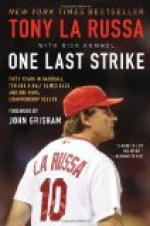There are supposed to be two ways to tackle, but the coach who was conducting the operations to-day undoubtedly believed in the existence of at least thrice that number; for each candidate for Varsity honors tackled the dummy in a totally different style. The lift tackle is performed by seizing the opponent around the legs below the hips, bringing his knees together so that further locomotion is an impossibility to him, and lifting him upward off the ground and depositing him as far backward toward his own goal as circumstances and ability will permit. The lift tackle is the easiest to make. The dive tackle pertains to swimming and suicide. Running toward the opponent, the tackler leaves the ground when at a distance of a length and a half and dives at the runner, aiming to tackle a few inches below the hips. A dive tackle well done always accomplishes a well-defined pause in the runner’s progress.
Joel was having hard work of it. Time and again he launched himself at the swaying legs, bringing the canvas man to earth, but always picking himself up to find the coach observing him very, very coldly, and to hear that exasperating gentleman ask sarcastically if he (Joel) thinks he is playing “squat tag.” And then the dummy would swing back into place, harboring no malice or resentment for the rough handling, and Joel would take his place once more and watch the next man’s attempt, finding, I fear, some consolation in the “roast” accorded to the latter.
It was toward the latter part of the second week of college. Joel had practiced every day except Sundays, and had just arrived at the conclusion that football as played at Harwell was no relation, not even a distant cousin to the game of a similar name played at Hillton. Of course he was wrong, since intercollegiate football, whether played by schoolboys or college students, is still intercollegiate football. The difference lies only in the state of development. At Hillton the game, very properly, was restricted to its more primary methods; at Harwell it is developed to its uttermost limits. It is the difference between whist over the library table and whist at the whist club.
But all things come to an end, and at length the coach rather ungraciously declared he could stand no more and bade them join the rest of the candidates for the run. That run was two miles, and Joel finally stumbled into the gymnasium tuckered out and in no very good temper just as the five o’clock whistle on the great printing house sounded.
After dinner in the dining hall that evening Joel confided his doubts and vexations to Outfield as they walked back to their room. “I wouldn’t care if I thought I was making any progress,” he wailed, “but each day it gets worse. To-day I couldn’t seem to do a start right, and as for tackling that old dummy, why—”
“Well, you did as well as the other chaps, didn’t you?” asked Outfield.
“I suppose so. He gave it to us all impartially.”




